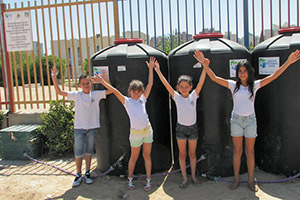
While water crises are fast becoming a significant part of life around the world, that trend is moving in the opposite direction in Israel.
Until recently, Israel experienced a perpetual water shortage that reached extreme proportions, primarily due to drought and over-consumption. But for the past several decades, Jewish National Fund (JNF) has worked to alleviate and mitigate Israel’s chronic water shortage through a range of water collection and conservation initiatives.
For example, JNF’s construction of close to 250 water reservoirs, which store reused and treated wastewater for agriculture, in addition to collecting flood and runoff water, effectively free up fresh water for human consumption. Likewise, JNF’s research on water treatment and geothermal water sources increase Israel’s water supply.
Solutions in the schoolyard
For the thousands of schoolchildren who participate annually in the Green Horizons-JNF Rainwater Harvesting Project, solutions for water conservation can be found right outside on the playground.
These budding young environmental stewards are taking action to address a particular aspect of the water shortage—inadequate use of rainfall. Currently, only 20 percent of Israel’s rainfall is being used, with the other 80 percent lost to evaporation or runoff into sewers or to the sea. In urban areas, where roads and buildings almost completely prevent saturation into groundwater, 95 percent of rainwater is wasted.
Together, JNF and the Green Horizons youth leadership organization are raising awareness about the water crisis, promoting conservation and helping students develop skills to address environmental challenges. In 24 schools throughout the country, Green Horizons provides guidance in those areas, and JNF water professionals teach students how to build and operate a rainwater harvesting system that collects and stores water in large barrels, then redirects it into school toilets and landscaping. The system not only reduces water consumption, but also increases school-wide awareness about water conservation.
After a training period, the project is run by the students themselves, with older children teaching the younger children. Occasionally, the arrangement works the other way around. In the Acacia “open school” in Rehovot, for example, an enthusiastic and water-savvy second-grader, Alon (name changed for this article to protect his priavacy) has reportedly taken over the instruction of the high school students.
The Green Horizons-JNF partnership has already generated 24 rain-harvesting projects. By last December, students in one Jerusalem school had already collected 22,500 gallons of water. With some 4,500 schools in Israel, the potential to increase utilization of rainwater is impossible to ignore.
Celebrating the harvest
Recently, a group of 1,000 schoolchildren from 25 schools throughout Israel gathered at the Be’er Sheva River Park to celebrate the culmination of another year of the rainwater harvesting project.
At the beginning of the event, each class received a map to help it navigate 15 fun and educational stations throughout the park that were created by JNF, Green Horizons and the Weitzman Institute of Science. The stations required the students to complete water-related tasks, such as directing water from one place to another via channels in the dunes, or assembling a puzzle that reflected an important lesson about water conservation.
The contest’s first-prize winner was a class from the Torah and Science School in Sderot, a school that combines religious and secular studies for a mostly haredi student body. Together with the other students, the winners signed a declaration of commitment to conserve and protect Israel’s water resources.
When the students return to school next year, the Green Horizons-JNF Rainwater Harvesting Project will seek to continue to empower them to take charge of their own water consumption and become environmental leaders in their schools and communities.
Ido Reichman Eisikovits, Green Horizons’ liaison to JNF, noted the diversity of the rainwater harvesting project.
“Because it looks at water from a lot of perspectives—science, geography, local and global issues—it appeals to all kinds of students,” he said.
By Leiba Chaya David/JNS.org













